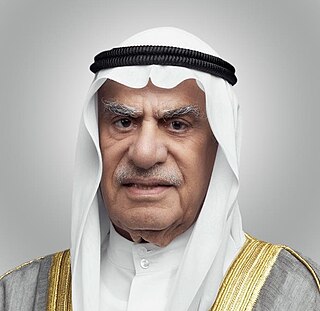Related Research Articles

The National Assembly was the unicameral legislature of Kuwait. The National Assembly met in Kuwait City. The National Assembly was made up of 50 elected members and 16 directly appointed government ministers.
Mandatory retirement also known as forced retirement, enforced retirement or compulsory retirement, is the set age at which people who hold certain jobs or offices are required by industry custom or by law to leave their employment, or retire.
Saad Madi Saad al Azmi is a Kuwaiti citizen. He was held in extrajudicial detention in the United States Guantánamo Bay detainment camps, in Cuba, and later repatriated on November 4, 2005. Joint Task Force Guantanamo counter-terrorism analysts report that al-Azmi was born on May 29, 1979, in Doha, Kuwait.
Human rights in Kuwait are a topic of significant concern. Most notably, Kuwait's handling of the stateless Bedoon crisis has come under substantial criticism from international human rights organisations and the United Nations. Kuwait has the largest number of stateless people in the entire region. Kuwait also faces significant criticism for the human rights violations against foreign nationals, women, and LGBT people. Although Kuwaiti law theoretically pledges to protect all human rights; the enforcement mechanisms designed to help protect human rights are very limited in Kuwait.

Ahmed Abdulaziz al-Sadoun was the Speaker of the Kuwaiti National Assembly from June 20, 2023 until February 15, 2024. He was previously the speaker from 1985 to 1999, from February 2012 until it was declared that the February 2012 elections were invalid and from October 2022 until it was declared in March 2023 that the September 2022 elections were invalid. He is the leader of the Popular Action Bloc in the Assembly and served for eight terms.

The Constitution of Kuwait was created by the Constitutional Assembly in 1961–1962 and signed into law on 11 November 1962 by the Emir, the Commander of the Military of Kuwait Sheikh Abdullah III Al-Salim Al-Sabah.
Abdullah Al-Roumi is a Kuwaiti politician and lawyer who served as the Deputy Prime Minister, Minister of Justice, and Supreme Attorney General of Kuwait. Notably, he was appointed Deputy Prime Minister in April 2021, marking the first time someone outside the ruling family held the position. Prior to his executive appointments, Al-Roumi was an elected member of the Kuwaiti National Assembly from the first district since 1985, known for his liberal and independent stance.
Jabir Al-Azmi is a former Kuwaiti politician, representing the fifth district. Born in 1970, Al-Azmi studied Sharia law and worked in at the Kuwait Ministry of Awqaf and Islamic Affairs before being elected to the National Assembly in 2006.
Jamaan Al-Harbash is a member of the Kuwaiti National Assembly representing the second district.
Nasser Jassim Abdullah Khalifa Al-Sane is a former member of the Kuwaiti National Assembly representing the third district. Born in 1955, Al-Sane obtained a PhD in Business Administration before being elected to the National Assembly in 1992. While political parties are illegal in Kuwait, Al-Sane affiliates with the Islamist Hadas party.
Hasan Johar is a member of the Kuwaiti National Assembly, representing the first district. He is a Kuwaiti of Iranian descent.
Hussain Ali Alsayyid Khalifa Hussain al-Qallaf is a former member of the Kuwaiti National Assembly, representing the first district. Born in 1958, Al-Qallaf studied Sharia law before being elected to the National Assembly in 1996. While political parties are technically illegal in Kuwait, Al-Qallaf affiliates with the Shia deputies.
Mikhled Rashid Saad Gharib Al-Azmi is a former member of the Kuwaiti National Assembly representing the first district. While political parties are technically illegal in Kuwait, Al-Azmi affiliates with Islamist deputies.
Khaled Sultan bin Essa was a member of the Kuwaiti National Assembly, representing the second district. Bin Essa earned an MA in business administration and was Chairman of the Kuwait Graduates Society before being elected to the National Assembly in 2008.
Waleed Al-Tabtabaie is a former member of the Kuwaiti National Assembly representing the third district. Born on April 4, 1964, Al-Tabtabaie obtained a PhD in Islamic studies from Al-Azhar and was an assistant professor at Kuwait University before being elected to the National Assembly in 1996. Al-Tabtabaie affiliated with the Islamist deputies.
Mohammed Hayef Sultan Areej Al-Mutairi is a Kuwaiti politician and member of the Kuwaiti National Assembly representing the fourth district. Born in 1964, Al-Mutairi studied Islamic studies and served in the Kuwait Municipality before being elected to the National Assembly in 2008. Al-Mutairi affiliates with Islamist deputies.

The women of Kuwait have experienced many progressive changes since the early 20th century. Since then, women have had increased access to education, gained political and economic rights, and financial power. They can serve in the police, military, and as judges in courts. However, women in Kuwait struggle against a patriarchal culture which discriminates against them in several fields. Kuwait's Bedoon (stateless) women are at risk of significant human rights abuses and persecution, Kuwait has the largest number of Bedoon in the entire region.

The Kuwaiti nationality law is the legal pathway for non-nationals to become citizens of the State of Kuwait. The Kuwaiti nationality law is based on a wide range of decrees; first passed in 1920 and then in 1959. An Amiri decree was passed later in 1960. Since the 1960s, the implementation of the nationality law has been very arbitrary and lacks transparency. The lack of transparency prevents non-nationals from receiving a fair opportunity to obtain citizenship. A number of amendments were made in 1980, 1982, 1994, 1998, and 2000.
Events in the year 2023 in Kuwait.
Hamdan Salem Al-Azmi is a Kuwaiti lawyer and politician serving in the National Assembly since 2013.